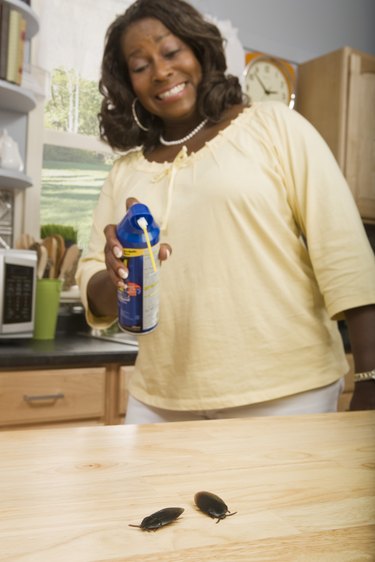
Bug sprays in the home help eliminate unwanted visitors, like cockroaches and ants, while sprays designed for outside use keep mosquitoes and ticks at bay. While these sprays can seem like magic when they make bugs curl up and die, they actually rely on special chemicals that are designed to stop bugs in their tracks. Understanding how these sprays work can help you choose the best product to keep your home free of pests and your body free of bites.
Common Killers
Video of the Day
Most bug sprays designed for the home rely on either pyrethrins or pyrethroids as their active ingredients. Pyrethrins are compounds found in chrysanthemum flowers, while pyrethroids are synthetic copies of these compounds. Imiprothrin and deltamethrin serve as two pyrethrins found in some of the top-selling bug sprays on the market.
Video of the Day
Knockdown Effect
When roaches, ants and other pests chew or walk on objects sprayed with bug spray, the chemicals in the spray are ingested or absorbed through the skin. These pyrethroid chemicals stop bugs virtually instantly, producing what is known as a "knockdown effect," where the bug is put out of commission very quickly. Within the insect's body, these chemicals prevent nerves from transmitting impulses or signals, resulting in paralysis of all major systems, which leads to a quick death.
Body Sprays
While bug sprays used in the home are designed to kill bugs, sprays used on the body are designed to confuse them. Bug repellent sprays help keep mosquitoes from biting, and rely on one of four main ingredients, including DEET, Picaridin, IR3535 and lemon eucalyptus oil. Without bug spray, mosquitoes use their strong sense of smell to find their victims based on scents like lactic acid and carbon dioxide. When you spray yourself with a bug repellent, you confuse the insect's sense of smell enough that it can't successfully land on you and bite your skin, allowing you to enjoy your time outdoors.
Concentration Counts
For both home and body bug sprays, the concentration of active ingredients has a much greater impact on effectiveness than brand name, according to Time Magazine. Contrary to popular belief, products with a higher concentration of chemicals don't necessarily work better; instead, they provide a longer protection period than sprays with a lower concentration of active ingredients.